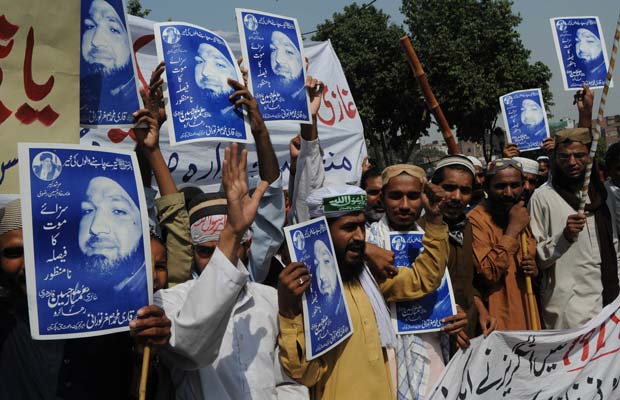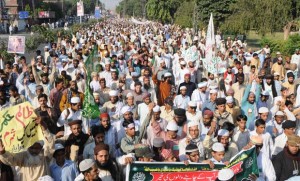
He was only 18 years old at the time he was hanged for blasphemy. The accusations against him included allegations that he had made statements that mocked the “holy scriptures” and all “revealed religion”. He was also said to have described theology as “a rhapsody of feigned and ill-invented nonsense”.

The man in question wasn’t another Pakistani being victimised by the country’s infamous blasphemy laws. Thomas Aikenhead was a Scottish medical student living in Edinburgh who left his mark on history as the last person to be hanged in Britain for blasphemy, in 1697. In his indictment he was, in fact, accused of having “preferred Mahomet to the blessed Jesus”. However, when he was taken to the gallows Aikenhead was said to have held a Bible in his hands and denied the claims made against him.
What is of interest about the incident is its timing: it took place at the dawn of the Scottish Enlightenment.
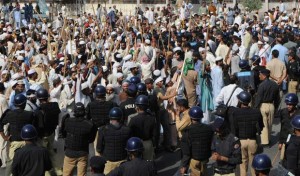
In that respect, Aikenhead’s punishment was telling of the urgent need for change in a society that had been mired in superstition and intolerance. Fast-forward to the modern age and parts of Pakistan find themselves living, some would say being dragged back, into the dark ages. Protests by religious fundamentalists have been taking place all over the country against the recent court decision to hang Mumtaz Qadri, the murderer of the liberal Punjab governor Salman Taseer. Now there comes news a Pakistani court has suspended the death sentence, pending an appeal made by Qadri against his conviction.
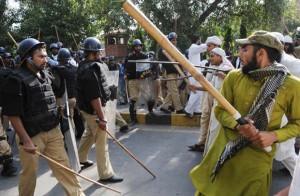
While Pakistan may not be at the cusp of some kind of enlightenment, it is a society being overwhelmed by the changes brought by modernity. At the same time the country finds itself being pulled in the opposite direction by strong regressive forces.
The furore over the blasphemy laws is indicative of a larger failing to understand the underlying causes behind the fundamentalist problem. Some of the most vocal street protests by admirers of Qadri have been by a group called the Sunni Tehreek. This is an organisation with roots in the Barelvi school of Islam, which has widespread adherents in the country. The Barelvis have for years been touted in certain western and liberal Pakistani circles as the more moderate answer to Saudi-exported Wahhabi or Salafi versions of Islam. But what one finds is the various Barelvi, Wahhabi, Deobandi and Shia schools of thought actually united in critiquing Taseer over his stance on the blasphemy laws. In fact, the Barelvis perhaps came out more fiercely than others in condemning the death sentence to Qadri. This is due to their supposedly stronger attachment to the Prophet Muhammad.
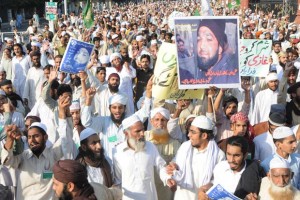
Unfortunately, post-September 11 there has been a taboo in understanding the rise in influence of Wahhabi Islam among Muslims. To imagine Barelvis or “Sufis” as all being peace-loving mystics and “moderates” simply doesn’t hold. Many people have been sucked into the more puritanical Wahhabi Islam as a reaction to superstitions they are led to believe have crept into Islam – such as offering prayers at tombs, celebrating the prophet’s birthday, visits to pirs (faith healers) who exploit people’s blind faith and other practices considered to be “shirk” or idolatry. Tragically, such literalist interpretation has also created an intolerant mentality, which has led to the shocking destruction of graves of many of the prophet’s close companions and family members in Mecca by the Saudis – wiping out irretrievably sites of great historic significance to Islamic culture.
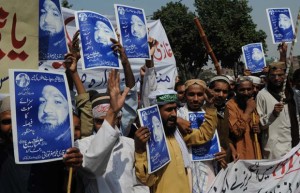
The various Barelvi clerics who are protesting against the death sentence for Taseer’s killer are, paradoxically, also the ones to have issued condemnations of Islamist terrorists and Taliban. Their shrines have been attacked by suicide bombers and Pakistan has witnessed prominent Barelvi figures killed in recent times. But the problem is we now have a situation where clerics loosely allied with the west in the “war on terror” are defending a man who has committed open murder.
In June 2009, in an article in Foreign Policy magazine, the writer Ali Eteraz warned of the folly of Washington’s policy of actively supporting one brand of Islam over another. “After years of bemoaning official Saudi sponsorship of Wahhabism, and condemning official Iranian sponsorship of milleniarian Islam, we are now being asked to celebrate a state-sponsored brand of Islam in Pakistan,” he wrote. “We are asked to believe this is ‘different’ from those other cases solely because it’s a version of the religion that looks benign. But not only is this unprincipled – it is going to backfire, leaving Sufism discredited and more religious resentment among the numerous peaceful Salafis in the world.” His prediction appears to be coming true.
Using one religious faction to confront another can be a dangerous strategy. For one, it only gives an excuse for more sectarian conflict in a country already rife with enough violence. More significantly, there lies the danger of turning a blind eye to religious groups appearing to be “moderate” who, when the time is ripe, may start to assert their own agenda using street power.
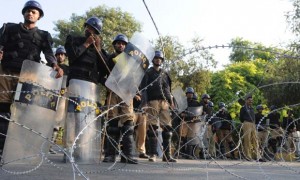
Instead, the starting point to confront this menace should be to highlight the selective outrage of the fundamentalists, as the Pakistani actress Veena Malik did earlier this year. Appearing on a TV show, Malik had an all-out confrontation with a mullah who had critiqued her over her appearance in the Indian version of Big Brother. “If you want to do something for the glory of Islam,” she retorted, “you have plenty of opportunities. What are the politicians doing? Bribery, robbery, theft and killing in the name of Islam. There are many things to talk about … There are Islamic clerics who rape the children they teach in their mosques and so much more.”
Sadly there are yet to be massive street rallies over these issues.

